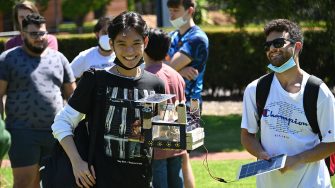Empowering Consumers at UNSW
Striving towards a consumer-led energy future.
Striving towards a consumer-led energy future.

UNSW is striving towards a consumer-led energy transformation, which provides clean, affordable, reliable and equitable energy to all.
We see the opportunity that exists in the rapid uptake of consumer energy resources, including rooftop solar that is on track to increase four-fold by 2050, which can be leveraged through energy system flexibility. However, for households, we recognise the risk of increasing inequity and energy poverty, and acknowledge the importance of securing social license. We also understand that businesses must ensure that environmental sustainability does not come at the cost of continued competitiveness and productivity. Thus, we are focused on research and technology outcomes that will improve the quality of life of citizens, as well as securing our future economic prosperity.
To achieve this goal, we are focused on research and development in three key areas:
Developing and deploying new technologies that improve energy efficiency and reduce emissions, helping energy users, large and small, achieve their net zero ambitions.
Leveraging flexibility in consumer energy resources to lower bills, improve grid resilience and integrate more renewable energy.
Putting people first in the energy transformation to deliver a more equitable future for all, considering the community voices in relation to energy governance, user-centred planning and a just transition.
UNSW leads Social Policy Research Centre, which is dedicated to tackling critical social issues through research focusing on poverty, inequality, wellbeing and justice. Members of the Centre study and design policies to improve social outcomes, and investigate the extent and impact of social inequality.
The Collaboration on Energy & Environmental Markets (CEEM) takes an interdisciplinary approach to understanding the technical, economic and social interactions that determine the uptake of consumer energy resources. CEEM researchers are highly engaged with industry partners and contribute to policy and regulatory development at state and national levels.

Australia leads the world in rooftop solar deployment, with solar panels installed on one-third of our houses, but there is more to be done. Installing solar on the unused roof space of our housing stock could save households an estimated $9.3 billion per year on their electricity bills. Over a third of these savings would go directly to Australians living in apartments, social housing and private rentals, who currently risk being left behind. If we can address the underlying causes of this inequity, and maximise the solar capacity of distribution networks, residential rooftop solar could contribute over 60 Gigawatts to Australia’s energy mix and reduce our greenhouse gas emissions by 785 Megatonnes over the next 20 years.
UNSW is working with governments, industry and communities to unlock Australia’s rooftop solar potential and create a more equitable energy transition. Our researchers promote open access tools, including the freely-available SunSPOT solar and battery calculator, to help more Australians get access to and benefit from new energy technology.